BusinessEurope Headlines No. 2019-12
Business emphasises the need to reform the WTO
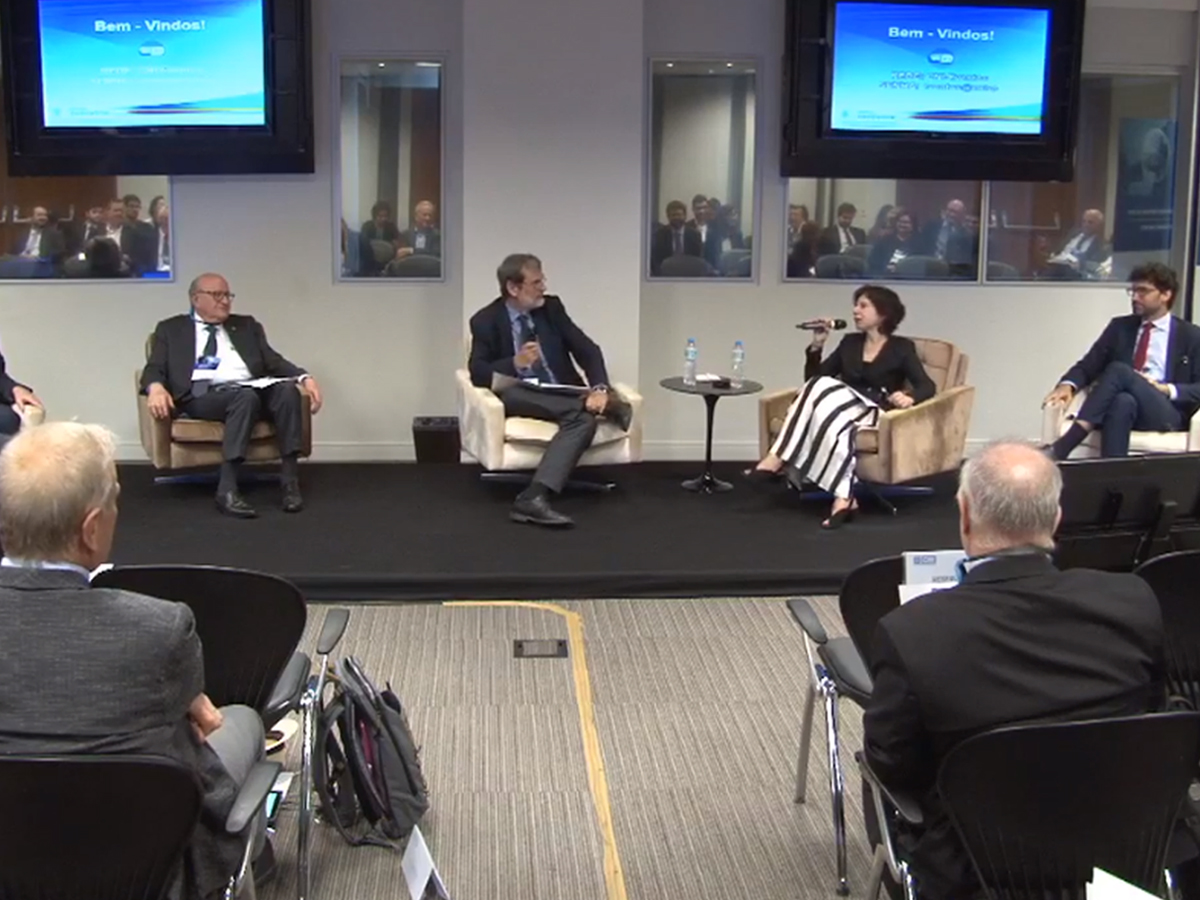
On 2 April, leading business organisations from Argentina, Brazil, the EU – represented by BusinessEurope, Mexico and the USA, met in São Paulo, Brazil. They agreed that the reform process in the World Trade Organisation (WTO) needs to be accelerated and called on governments to increase their efforts as a matter of urgency. Speaking on behalf of BusinessEurope, Luisa Santos, International Relations Director said: “Our message is clear: rules-based multilateral trade and the WTO are indispensable for business. We urge governments to work on reforming the WTO in order to render it a modern, efficient and effective organisation, able to respond to the challenges of today and tomorrow”. The proposals of the business community, which may be found in the published joint statement, concentrate around five axes: 1) on the need to save urgently the dispute settlement system, focusing on the nomination, review and approval of Appellate Body members; 2) on the need to update, strengthen and modernise WTO rules, paying particular attention at trade-distorting subsidies and rules on State-Owned Enterprises, improving market access for goods and services as well as ensuring that flexibilities are available to those WTO members that need them; 3) on the need to improve the monitoring function of the WTO; 4) on improving the WTO’s rule-making function, for instance by pursuing plurilateral negotiations in order to move at a quicker pace on important issues, such as e-commerce; and 5) on launching a structured business advisory committee, as a permanent contact point between the WTO and the business community.
![]() Contact: Sofia Bournou
Contact: Sofia Bournou
Video message: Thanks to Europe
Why do we need the European Union? Should we go vote in the European elections in May this year? Looking for some answers, we talked to people from all around Europe who either run or work at companies of all sizes. Watch what they have to say about Europe.
Chinese foreign direct investment into the EU: implications for business
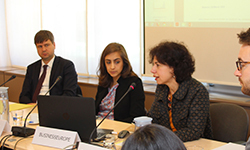 On 29 March, BusinessEurope hosted the “Roundtable Discussion on Chinese FDI in the European Union: the implications for European business and policy-making”. The event was organised in the context of a new report on Chinese FDI in Europe released by Rhodium and MERICS. Mikko Huotari (Merics) and Agatha Kratz (Rhodium) explained that after a decade of increasing Chinese FDI in the EU, peaking at EUR 37 billion in 2016, inbound investments dropped sharply in 2017 (29,1 billion) and 2018 (17,3 billion). Additionally, their analysis showed that the share of state-owned enterprise (SOE) investment is significant as it averaged 50-60% over the past 5 years, representing 41% of aggregate investment in 2018. “BusinessEurope supports a calibrated, risk-based approach that respects the balance between achieving legitimate security and public order objectives while maintaining an open and welcoming environment for much needed FDI in the EU”, said Luisa Santos, Director for International Relations, at the event. The attendants furthermore exchanged best practices regarding national FDI screening mechanisms.
On 29 March, BusinessEurope hosted the “Roundtable Discussion on Chinese FDI in the European Union: the implications for European business and policy-making”. The event was organised in the context of a new report on Chinese FDI in Europe released by Rhodium and MERICS. Mikko Huotari (Merics) and Agatha Kratz (Rhodium) explained that after a decade of increasing Chinese FDI in the EU, peaking at EUR 37 billion in 2016, inbound investments dropped sharply in 2017 (29,1 billion) and 2018 (17,3 billion). Additionally, their analysis showed that the share of state-owned enterprise (SOE) investment is significant as it averaged 50-60% over the past 5 years, representing 41% of aggregate investment in 2018. “BusinessEurope supports a calibrated, risk-based approach that respects the balance between achieving legitimate security and public order objectives while maintaining an open and welcoming environment for much needed FDI in the EU”, said Luisa Santos, Director for International Relations, at the event. The attendants furthermore exchanged best practices regarding national FDI screening mechanisms.
Contact: Maurice Fermont
EU industry strategy discussed with Member States
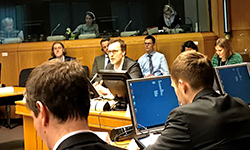 “Europe needs to become more strategic than in the past to respond to a fast-changing world. It is not about becoming inward-looking as this would be penalising for Europe”, said Alexandre Affre, BusinessEurope Industrial Affairs Director, at the Competitiveness and Growth (Industry) Working Party on 4 April. “With half of European business in global value chains, a closed Europe would only hurt us. But Europe needs to become more offensive around strategic value chains that are key to EU industrial competitiveness and strategic autonomy”, Affre added. He also stressed that fostering industrial innovation and competitiveness requires targeted measures: the window of opportunity for companies to gain rapid competitive advantages is typically at the interface between applied research and commercialisation.
“Europe needs to become more strategic than in the past to respond to a fast-changing world. It is not about becoming inward-looking as this would be penalising for Europe”, said Alexandre Affre, BusinessEurope Industrial Affairs Director, at the Competitiveness and Growth (Industry) Working Party on 4 April. “With half of European business in global value chains, a closed Europe would only hurt us. But Europe needs to become more offensive around strategic value chains that are key to EU industrial competitiveness and strategic autonomy”, Affre added. He also stressed that fostering industrial innovation and competitiveness requires targeted measures: the window of opportunity for companies to gain rapid competitive advantages is typically at the interface between applied research and commercialisation.
Contact: Alexandre Affre
BusinessEurope at 23rd European Corporate Governance Conference
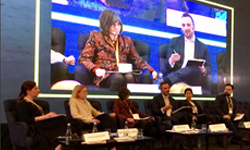 A good corporate governance culture and business ethics are essential to prepare companies for the long term and to allow them to show leadership in a changing world where confidence is lacking in traditional institutions. But culture and ethics cannot be imposed by law. They should come from within the company, involving boards, shareholders, investors and workers. For many years, corporate governance codes have provided the blueprint for companies to fulfil their objectives towards shareholders (e.g. value, growth) but also towards the context surrounding them (e.g. environment, society at large). Their use should continue to be nurtured and potentially extended, in a non- binding way, to non-listed companies as this will make them more resilient to adversities and more attractive to lenders/investors. These messages were voiced by BusinessEurope at the 23rd European Corporate Governance Conference in Bucharest, on 2 April.
A good corporate governance culture and business ethics are essential to prepare companies for the long term and to allow them to show leadership in a changing world where confidence is lacking in traditional institutions. But culture and ethics cannot be imposed by law. They should come from within the company, involving boards, shareholders, investors and workers. For many years, corporate governance codes have provided the blueprint for companies to fulfil their objectives towards shareholders (e.g. value, growth) but also towards the context surrounding them (e.g. environment, society at large). Their use should continue to be nurtured and potentially extended, in a non- binding way, to non-listed companies as this will make them more resilient to adversities and more attractive to lenders/investors. These messages were voiced by BusinessEurope at the 23rd European Corporate Governance Conference in Bucharest, on 2 April.
Contact: Pedro Oliveira
Mainstreaming the gender dimension in CETA
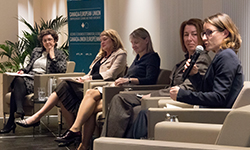 On 1 April, the Mission of Canada to the EU in Brussels held the “CETA Workshop on Trade and Gender”. The event was designed to contribute to the implementation of the EU-Canada Comprehensive Economic and Trade Agreement (CETA) Joint Committee Recommendation on Trade and Gender, after the EU and Canada agreed to cooperate to increase women's access to and benefit from the opportunities created by the agreement in September 2018. Eleonora Catella, BusinessEurope’s Senior Adviser for International Relations, shared views and experience from women-led businesses under CETA in order to identify if there are opportunities and challenges specific to women-led businesses and if support is needed from the governments. She stated that gender inequality carries serious costs in terms of social justice and human dignity, but also reduces economic growth and competitiveness. As research suggests that the liberalisation of trade impacts men and women differently, we need gender disaggregated data and methodologies for collecting gender-specific trade data, in order to assess if women-led businesses are for example found in higher proportion in specific economic sectors so that the right policy response can be identified. Furthermore, flanking policies like education, training and welfare policies will also play an important role.
On 1 April, the Mission of Canada to the EU in Brussels held the “CETA Workshop on Trade and Gender”. The event was designed to contribute to the implementation of the EU-Canada Comprehensive Economic and Trade Agreement (CETA) Joint Committee Recommendation on Trade and Gender, after the EU and Canada agreed to cooperate to increase women's access to and benefit from the opportunities created by the agreement in September 2018. Eleonora Catella, BusinessEurope’s Senior Adviser for International Relations, shared views and experience from women-led businesses under CETA in order to identify if there are opportunities and challenges specific to women-led businesses and if support is needed from the governments. She stated that gender inequality carries serious costs in terms of social justice and human dignity, but also reduces economic growth and competitiveness. As research suggests that the liberalisation of trade impacts men and women differently, we need gender disaggregated data and methodologies for collecting gender-specific trade data, in order to assess if women-led businesses are for example found in higher proportion in specific economic sectors so that the right policy response can be identified. Furthermore, flanking policies like education, training and welfare policies will also play an important role.
Contact: Eleonora Catella
Photo copyright: Mission of Canada to the EU
Social Partners discuss with Ministers of Labour of 43 countries
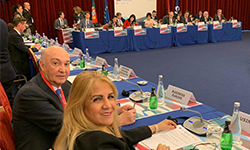 “We welcome that the added value of the social dialogue is recognised by the Ministers of Labour of the 43 Union for Mediterranean (UfM) countries. We also welcome that the cooperation between governments and social partners of the two regions - the North and the South of the Mediterranean - supports capacity building for social dialogue development”, said Jose Maria Lacasa, Head of the BusinessEurope’s delegation to the 4th UfM Ministerial Conference. BUSINESSMED, ATUC, ETUC and BusinessEurope confirmed their commitment to continue dialogue and cooperation by proclaiming a joint statement in Cascais, Portugal, on 2 April 2019. In this statement, social partners stressed the need for concrete actions to address the challenges faced by the member countries of the UfM. These actions should address common challenges such as job creation, skills development or migration, while taking into account significant differences that exist between the two regions.
“We welcome that the added value of the social dialogue is recognised by the Ministers of Labour of the 43 Union for Mediterranean (UfM) countries. We also welcome that the cooperation between governments and social partners of the two regions - the North and the South of the Mediterranean - supports capacity building for social dialogue development”, said Jose Maria Lacasa, Head of the BusinessEurope’s delegation to the 4th UfM Ministerial Conference. BUSINESSMED, ATUC, ETUC and BusinessEurope confirmed their commitment to continue dialogue and cooperation by proclaiming a joint statement in Cascais, Portugal, on 2 April 2019. In this statement, social partners stressed the need for concrete actions to address the challenges faced by the member countries of the UfM. These actions should address common challenges such as job creation, skills development or migration, while taking into account significant differences that exist between the two regions.
![]() Contact: Anna Kwiatkiewicz-Mory
Contact: Anna Kwiatkiewicz-Mory
Public procurement should become more business-friendly
 Professionalisation and simplification are key areas for BusinessEurope in public procurement. That was the main message of Basje Bender, Adviser for Internal Market, during a meeting of the Commission stakeholder expert group on public procurement, in Bucharest, Romania, on 3 April. The tasks of the expert group, to which BusinessEurope was recently accepted, is to provide the European Commission with legal, economic, technical and/or practical insight and expertise to assist in shaping public procurement policy. Main topics on the agenda were single bids and collusion. Bender underlined that supplier-friendly tendering should be a priority in the implementation of the public procurement directives.
Professionalisation and simplification are key areas for BusinessEurope in public procurement. That was the main message of Basje Bender, Adviser for Internal Market, during a meeting of the Commission stakeholder expert group on public procurement, in Bucharest, Romania, on 3 April. The tasks of the expert group, to which BusinessEurope was recently accepted, is to provide the European Commission with legal, economic, technical and/or practical insight and expertise to assist in shaping public procurement policy. Main topics on the agenda were single bids and collusion. Bender underlined that supplier-friendly tendering should be a priority in the implementation of the public procurement directives.
Contact: Basje Bender
European Business Summit will tackle challenges of tomorrow’s Europe
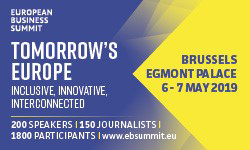 Europe is at a crossroads facing an array of new demands and challenges. How can Europe compete in a complex and increasingly interconnected world? Can Europe forge a cohesive leadership to overcome the biggest challenges of the century? This year we look to Tomorrow’s Europe, through the lens of the key words: Inclusive, Innovative, Interconnected. Speakers and participants of the European Business Summit on 6 and 7 May 2018 in Brussels will discuss the future facing citizens, companies and governments alike. As ever the EBS platform is the best opportunity to get your point across to influential policy-makers and C-suite business representatives. This year high-level speakers include: Jyrki Katainen, Vice-President and EU Commissioner for Jobs, Growth, Investment and Competitiveness; Cecilia Malmström, EU Commissioner for Trade; Camille Grand, Assistant Secretary General of Defence Investment at NATO; Ilham Kadri, CEO of Solvay; Bruno Liebhaberg, Director General of Centre on Regulation in Europe; Åshild Hanne Larsen, Chief Information Officer at Equinor; Pierre Gattaz, President of BusinessEurope; Marietje Schaake, Member of European Parliament; Kristian Jensen, Minister of Finance for Denmark. View the program, speakers and register to join the debate at the European Business Summit ! See you on May 6 and 7 in Brussels.
Europe is at a crossroads facing an array of new demands and challenges. How can Europe compete in a complex and increasingly interconnected world? Can Europe forge a cohesive leadership to overcome the biggest challenges of the century? This year we look to Tomorrow’s Europe, through the lens of the key words: Inclusive, Innovative, Interconnected. Speakers and participants of the European Business Summit on 6 and 7 May 2018 in Brussels will discuss the future facing citizens, companies and governments alike. As ever the EBS platform is the best opportunity to get your point across to influential policy-makers and C-suite business representatives. This year high-level speakers include: Jyrki Katainen, Vice-President and EU Commissioner for Jobs, Growth, Investment and Competitiveness; Cecilia Malmström, EU Commissioner for Trade; Camille Grand, Assistant Secretary General of Defence Investment at NATO; Ilham Kadri, CEO of Solvay; Bruno Liebhaberg, Director General of Centre on Regulation in Europe; Åshild Hanne Larsen, Chief Information Officer at Equinor; Pierre Gattaz, President of BusinessEurope; Marietje Schaake, Member of European Parliament; Kristian Jensen, Minister of Finance for Denmark. View the program, speakers and register to join the debate at the European Business Summit ! See you on May 6 and 7 in Brussels.
Calendar
- 9 April: EU-China Summit
- 9 April: High-level conference: The Future of Work
- 9 April: EU Digital Day
- 10 April: The Single Market: Taking it seriously
- 11 April: The future of manufacturing in Europe
Reminder: please take a look at our revised privacy policy